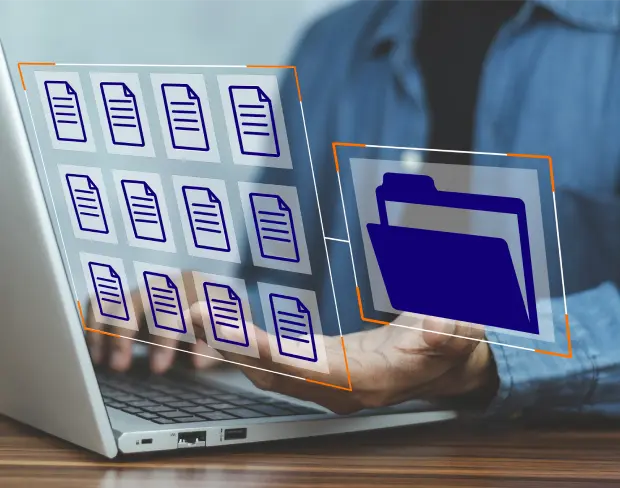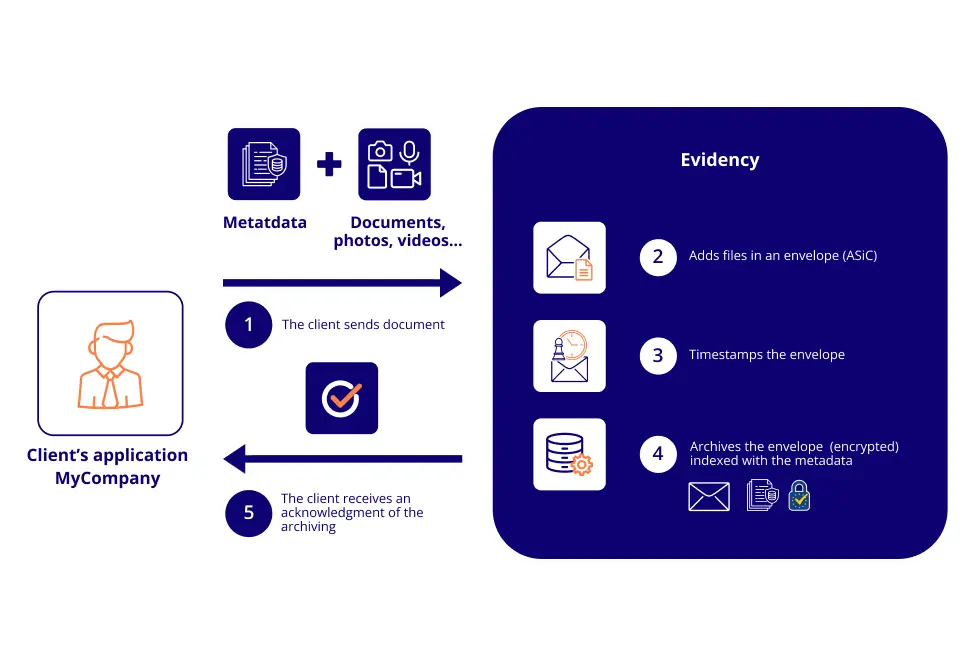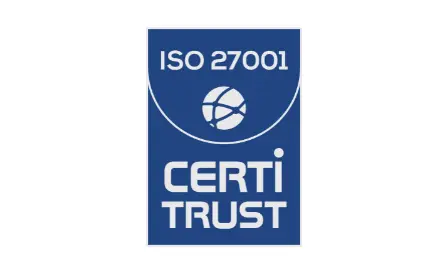Electronic Archiving with Evidency,
your guarantee of longevity and integrity

Electronic archiving is one of the pillars of digital transformation for businesses, ensuring the longevity, security, and accessibility of their sensitive documents.
It not only helps meet regulatory and compliance requirements but also optimises document management by reducing the risks of loss, falsification, or unauthorised access, while cutting costs associated with physical archiving.
Ensure the longevity and security
of your evidence with Evidency’s Electronic Archiving solution
Legal Compliance
Adheres to GDPR and eIDAS.
Secure & thorough
Advanced security mechanisms, including AES 256-bit encryption and ISO 27001 certified infrastructures.
Long-term trust
Guarantees authenticity, integrity, and availability over time.
Cost optimisation
Data compression using the ASIC format, maintaining the integrity and reversibility of your archived documents.
Electronic archiving:
How does it work?
Document submission: Documents and associated metadata are uploaded to our archiving platform via a REST API.
Creation of the ASIC archive, digital sealing, and timestamping: Each document is encapsulated in an ASIC (Associated Signature Container) format, sealed with a qualified electronic timestamp, ensuring its integrity and submission date.
Secure and replicated storage: The archives are encrypted and stored within our secure, replicated infrastructures, offering robust protection against tampering, loss, or unauthorised access.
Access: Access your archives via our online portal or API, and retrieve them in their original format with guarantees of compliance, security, and integrity.


Simplified management with the Evidency API
Evidency’s solution is designed for managing large volumes of documents via an API that links the client’s system with the Evidency platform. This solution offers numerous advantages:
Easy integration for technical teams
The Evidency API integrates smoothly with your existing systems, supported by complete documentation, ready-to-use libraries, and detailed tutorials, making the process quick and efficient.
Peace of mind
Once set up, the archiving happens automatically, in line with the required standards of integrity and security.
Advanced features
The solution offers search and access functionalities, allowing authorised users to locate and retrieve specific documents for evidentiary purposes.
Why choose
Evidency’s Electronic Archiving?
Evidential value
We guarantee the readability, integrity, authenticity, traceability, and accessibility of your documents—essential elements for their acceptance as reliable evidence.
Data longevity
We use durable file formats and perform regular re-timestamping to prevent cryptographic obsolescence. The ASIC format ensures your archives maintain their integrity over time.
Availability
Your documents are always accessible and easily usable by authorised individuals, with customisable metadata to facilitate their search and retrieval. The search engine on our platform allows you to quickly locate documents, even among vast amounts of data.
Traceability and lifecycle management
Every action taken on your archived documents is recorded to ensure full traceability. We provide detailed reports on the lifecycle of each archive to simplify management and audits.
Electronic archiving:
reliable and enduring digital evidence
Deposit your documents with a European trusted third party, certified to ISO 27001.

Trust our electronic archiving solution,
hosted in France on an ISO 27001 certified infrastructure. This certification ensures rigorous information security management, offering optimal protection of your documents from unauthorised access and cyberattacks, and guaranteeing service continuity.
Preserve the evidential value of your documents and comply with long-term retention obligations.
Our digital archiving is developed with reference to the NF Z42-013 standard,
ensuring the preservation of your documents’ evidential value. We ensure your documents remain intact, authentic, and legally valid throughout their retention period, keeping you compliant with the legal and regulatory requirements of your sector.
Find a specific document from your archives instantly.
Whether for an audit, inspection, or dispute, our solution allows you to immediately locate a specific document among millions, thanks to our powerful search engine.
Archive all your
documents
A company is obliged to keep every document generated or received in the course of its business for a minimum period, depending on the type of document and the legal requirements in force. Here are a few examples:
Customer and supplier invoice: 10 years
Customs declaration: 3 years
Payslip: 5 years
Sales tax: 6 years
Commercial contract: 5 years
Annual accounts: 10 years
Purchase order, delivery or receipt note: 10 years
Lawyer’s file: 5 years
Our priority:
Trust and security
As a qualified Trust Service Provider (TSP), our solutions meet ANSSI’s regulatory, technical, and security requirements in accordance with eIDAS regulations, as well as the ISO 27001 standard.
Thanks to our centralised approach, we offer seamless integration and simplified proof management.

Pricing
based on the volume and storage duration
From €1,000 excluding tax per month
Annual packages tailored to large corporate volumes
No set-up fees or user limitations
Qualified timestamping included
Support service included
How can we help you?
Trust our dual expertise to provide you with reliable solutions tailored to your specific needs in digital trust management.
FAQ
Electronic Archiving
What is electronic archiving?
Definition: electronic archiving is a structured and secure process that preserves digital documents in a reliable way, ensuring their integrity, authenticity, and long-term accessibility.
It is a key pillar of digital transformation for businesses, guaranteeing the sustainability of digital evidence while meeting legal requirements such as the GDPR and the eIDAS regulation.
What is the difference between storage and electronic archiving?
Electronic storage simply means keeping digital files on a device or in the cloud for quick and everyday access. It is practical for daily document management, but it does not guarantee their integrity, authenticity, or legal value over the long term.
Electronic archiving, on the other hand, is a structured and secure process designed to preserve digital documents permanently, ensuring their integrity, authenticity, accessibility, and legal recognition throughout their entire retention period.
How does an electronic archiving system (EAS) work?
An electronic archiving system (EAS) preserves digital documents securely and in compliance with legal requirements. Its functioning relies on several key stages:
- Collection and ingestion: documents (invoices, contracts, emails, etc.) are centralised within the EAS from various IT systems or applications.
- Indexing and classification: each document is linked to metadata (date, type, author, reference, etc.) to facilitate future search and access.
- Security and integrity: documents are protected by cryptographic and timestamping mechanisms, ensuring they have not been altered and preserving their probative value.
- Long-term storage: files are kept on secure media with backup and replication procedures, ensuring long-term availability.
- Access and traceability: authorised users can consult documents through secure interfaces, while all actions are logged to ensure traceability and regulatory compliance.
Thus, an EAS goes beyond simple storage: it guarantees the legal preservation, security, and reliability of digital documents throughout their lifecycle.
Is electronic archiving legally recognised? What are the regulatory requirements?
Yes, electronic archiving is legally recognised as long as it complies with strict rules guaranteeing the integrity, authenticity, and availability of documents. To be admissible before authorities and courts, an electronic archiving system (EAS) must comply with the requirements of the eIDAS regulation.
What is probative electronic archiving?
Probative archiving is a process of preserving digital documents that guarantees their authenticity, integrity, and traceability over the long term. This type of archiving enables companies and organisations to present their documents as reliable digital evidence in the event of an audit, litigation, or regulatory inspection.
What standards govern electronic archiving?
Electronic archiving is governed by several standards that guarantee the security, integrity, and traceability of digital documents:
- NF Z42-013 standard: the French reference standard for probative electronic archiving, defining technical and organisational requirements for the long-term preservation of documents.
- ISO 14641 standard: an international standard complementing NF Z42-013, specifying best practices for digital archive management and interoperability.
Are my electronically archived documents secure?
Yes, an electronic archiving system relies on advanced security mechanisms to ensure the protection of archived data. Documents are not only stored, they are secured through:
- Cryptographic and timestamping processes that ensure integrity and prevent undetected modification.
- Certified technical environments that guarantee confidentiality and availability of archives.
- Strict access controls combined with full traceability of all document-related actions.
In this way, secure electronic archiving ensures that your digital documents remain reliable, protected, and usable throughout their lifecycle.
Who can access my electronic archives?
Access to digital archives is strictly regulated to guarantee confidentiality. Only individuals authorised by the organisation owning the documents can access them, based on predefined rights (for example: internal staff, legal departments, external auditors).
Electronic archiving systems include strong authentication and rights management mechanisms that precisely control who can view, modify, or extract a document. Every action is logged, ensuring complete and transparent traceability of access.
Thus, your electronic archives remain protected and accessible only to authorised individuals, in full compliance with security and regulatory requirements.
What are the benefits of electronic archiving for a company?
Electronic archiving provides companies with numerous benefits in terms of document management and compliance:
- Security and reliability: documents are protected with mechanisms ensuring their integrity and authenticity.
- Time and efficiency savings: digital archives are easy to access, simplifying document search and use.
- Cost reduction: digital archiving reduces space needs and costs related to paper storage.
- Regulatory compliance: by complying with standards and the eIDAS regulation, companies benefit from legally recognised probative archiving.
- Full traceability: every action on a document is recorded, providing complete visibility of its lifecycle.